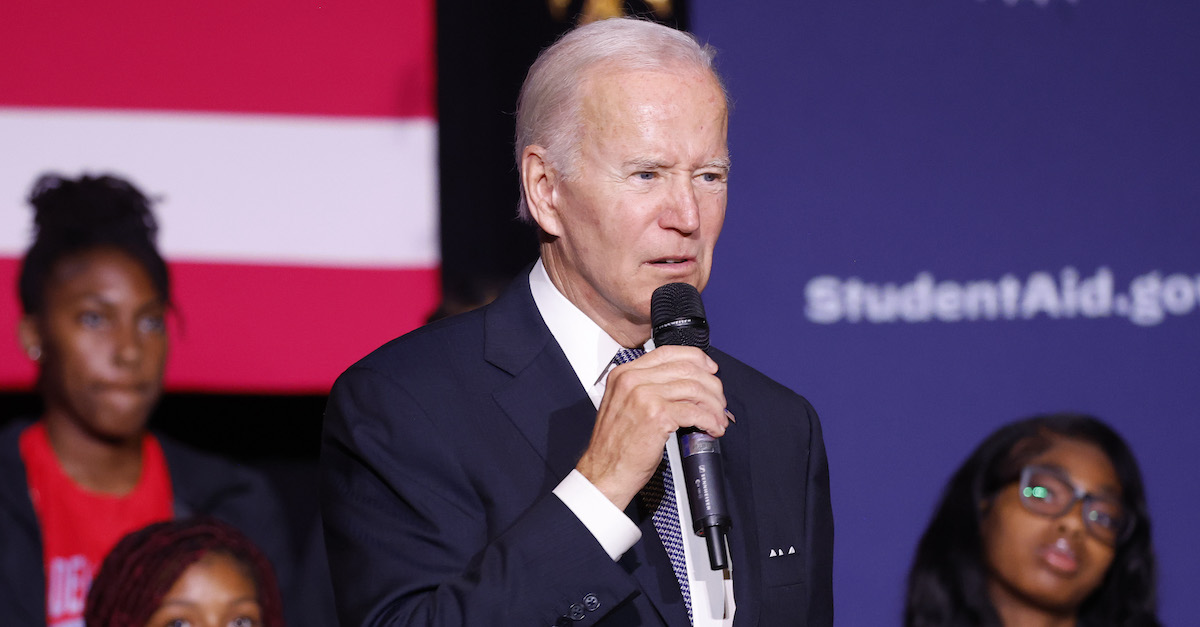Inside Biden Admin’s Student Debt Relief Brief SCOTUS – The federal government filed its brief with the Supreme Court Wednesday night in a pair of combined challenges to the Biden administration’s student-loan forgiveness program. The justices are scheduled to hear oral arguments in two cases on Feb. 28, 2023: Department of Education v. Brown and Biden v. Nebraska.
Biden’s program forgives up to $20,000 in federal student loans for qualified borrowers. Legally, the administration accomplished this via the Higher Education Relief Opportunities for Students Act of 2003 (the “HEROES Act”), which allows the federal government to adjust the terms of student loan programs during national emergencies — in this case, the COVID-19 pandemic.
 President Joe Biden gives remarks on student debt relief at Delaware State University on October 21, 2022 in Dover, Delaware.
President Joe Biden gives remarks on student debt relief at Delaware State University on October 21, 2022 in Dover, Delaware.
Inside Biden Admin’s Student Debt Relief Brief SCOTUS
The promise to ease student debt had been a cornerstone of Biden’s 2020 presidential agenda, and legal challenges to its implementation erupted immediately after it was announced.
Myra Brown has an outstanding student loan that is ineligible for forgiveness, because it is held by a commercial entity, and Alexander Taylor is eligible only for $10,000 in relief, because he did not receive a Pell Grant. The two borrowers sued the Department of Education and challenged Biden’s authority to enact the plan. They argued that because the plan was adopted without the proper notice-and-comment period, they were deprived of the chance to argue that their loans should be forgiven too.
Brown and Taylor succeeded in temporarily blocking the president’s plan when a federal judge in Texas ruled that the Biden administration had no power to enact the plan.
U.S. District Judge Mark Pittman, a Donald Trump appointee, sided with Brown and Taylor in November and wrote, “We are not ruled by an all-powerful executive with a pen and a phone,” but rather, “by a Constitution that provides for three separate and independent branches of government.” Pittman struck down the plan nationwide, and both he and the U.S. Court of Appeals for the Fifth Circuit denied the federal government a stay of Pittman’s order while the administration’s appeal worked its way through the courts.
Meanwhile, in a separate case, a coalition of Republican-controlled states including Arkansas, Iowa, Kansas, Missouri, Nebraska, and South Carolina, had already brought suit in federal court against the student-loan plan. The states lost at first when a district judge ruled that they had no standing to maintain a case, because they had identified no harm from the debt relief plan.
Those states appealed and a three-judge panel of the U.S. Court of Appeals for the Eighth Circuit issued an injunction pending appeal. The decision was authored by George W. Bush-appointed Judge Bobby Shepherd (and joined by Trump-appointed Judges Ralph R. Erickson and L. Steven Grasz).
The Supreme Court will now consider what happens with Biden’s plan as the underlying challenge to its legality is litigated. The justices fast-tracked the dispute over whether the $400 billion program will remain on hold while the cases proceed.
Justice Amy Coney Barrett unilaterally turned down two earlier requests from conservative groups to halt the program without comment. The current pair of cases before the justices differs, however, in that in those, it was the Biden administration that asked the high court to intervene.
In the government’s brief to the Court, Solicitor General Elizabeth Prelogar argued that the administration’s authority to implement its plan had been authorized.
“Several provisions of the HEROES Act underscore Congress’s intent to authorize the Secretary to respond quickly and fully to national emergencies,” stated the brief, which went on to remind the Court of repeated instances in which the law was extended and used to provide varied financial relief. Student loan relief was one kind of assistance deemed to be helpful during the unprecedented COVID-19 pandemic, it explained.
The administration said in its filing that the plan was based on specific financial data and urged the Court to protect “millions of economically vulnerable borrowers in limbo.” On the other hand, it argued, arguments against the plan “rest[] on a chain of speculation,” and misinterpretations of the HEROES Act created by “manufactured limits found nowhere in the Act.”
As for the Republican-led states that filed suit in the Nebraska case, the federal government railed against the notion that they had sufficient standing under Article III, calling any harm to those states’ treasuries “self-inflicted.”
“The States have no obligation to track the federal definition of gross income,” it argued in the brief, and pointed out, “indeed, two of the six States that have brought this suit (Arkansas and Missouri) evidently do not do so.”
The administration also argued that Brown and Taylor lack standing, because even a win would not help the two individuals in any way. Per the brief:
[A ruling against the debt-relief plan] leaves Brown’s financial position unchanged; she would still receive no loan forgiveness. And it would leave Taylor worse off than before; he would receive neither the $10,000 the plan provides nor the $20,000 he purports to seek, but instead nothing at all.
Indeed, the administration’s telling of the case’s potential impact on Brown and Taylor reads like a logical fallacy:
And private respondents purport to assert that the plan injures them because it provides too little debt relief, but seek a remedy that would result in no debt relief at all. This Court should reject those convoluted theories and hold that none of the respondents has established Article III standing to challenge the plan.
Prelogar also made an effort to stave off a line of reasoning that the justices have raised several times of late — the “major questions doctrine.” The rule demands that when a question of great political or economic importance is at stake, Congress must be specific in its delegation of authority to regulate the matter.
The solicitor general argued so as to squelch any “major questions” that might arise:
Even if the major questions doctrine applied, it would not justify invalidating the plan. The central interpretive question in the case is whether the HEROES Act authorizes the Secretary to grant loan forgiveness. On that score, the Act’s unambiguous text provides the “clear congressional authorization” that the major questions doctrine demands.
You can read the full brief here:
Oral arguments will be livestreamed by the Supreme Court beginning at 10:00 a.m. Eastern Time on Feb. 28 at this link.
[Photo by Anna Moneymaker/Getty Images.]Have a tip we should know? [email protected]
Continue to check our website for more articles of this kind. And, please use our comment section as well, we would love to hear from you.









